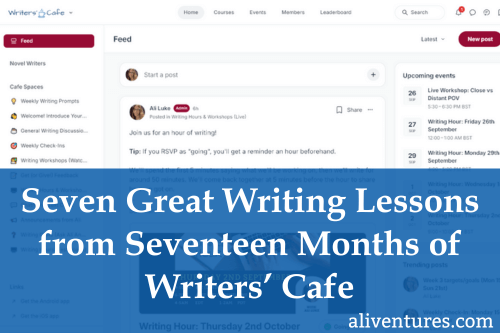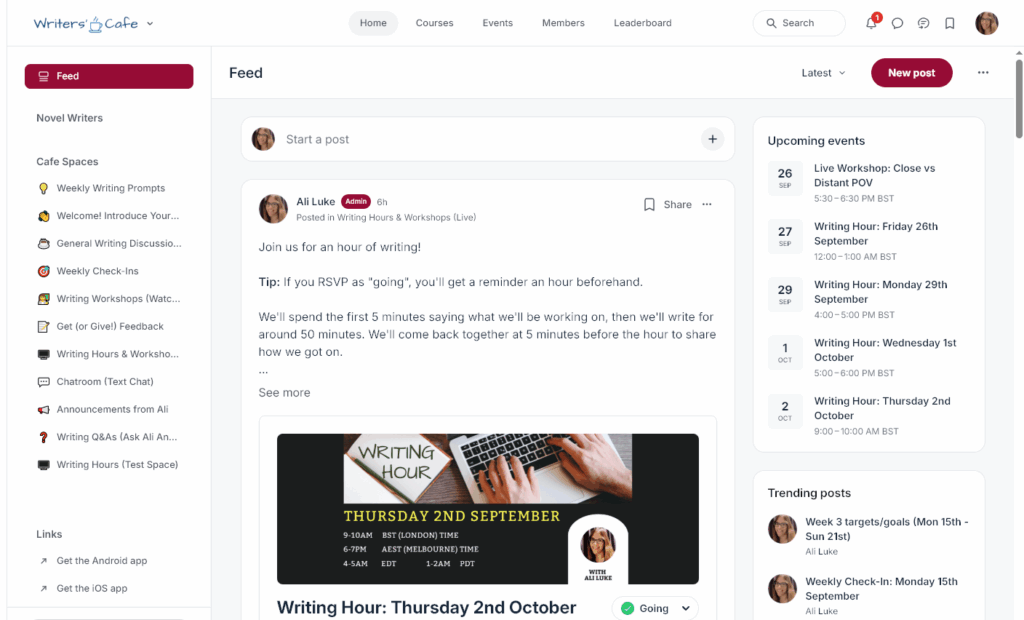Seven Great Writing Lessons from Seventeen Months of Writers’ Cafe

I launched Writers’ Cafe in May 2024 … and it’s been fantastic to see lots of different writers come through the doors!
Through our weekly check-ins and writing hours, it’s been great to get insights into how different writers are tackling a huge range of projects.
I wanted to share some of the writing lessons I’ve seen coming out of Writers’ Cafe.
#1: Writers Are Such Truly Lovely People 🙂
In Writers’ Cafe, we have writers who are chatty extroverts, writers who are quiet and reserved, and everyone in between … but every single person in Writers’ Cafe is lovely, friendly, and supportive of others.
It’s great to see the encouraging comments on other people’s posts – and the celebration of everyone’s wins, big and small. I know how much the support of other writers has meant to me over 26 years (!) of creative writing, and I’m thrilled that Writers’ Cafe has attracted so many kind, encouraging writers who are supporting one another.
#2: Life Can So Often Get in the Way of Writing
Something that’s become apparent, watching people “check in” week by week, or chat at the start of writing hours, is that we all have difficult weeks or months – times when life just gets in the way.
Whether it’s a tough family situation, ill-health, a hectic time at the day job, or even something fun like a holiday … sometimes writers need to step away for a while and take a break from writing. This is part of the writing life we probably all have to factor in, allowing for times when we’re writing little or nothing.
#3: We All Have (Different) Low/High Energy Times for Writing
Because Writers’ Cafe has writers from a wide range of timezones (spanning from Australia to the Pacific – a 17 hour time difference!) it’s always tricky to figure out the best times for our live writing hours.
Some writers love to write in the mornings and others in the evenings, so that complicates things too! Some of us are morning larks who do our best work before noon; others are barely kicking into gear by noon and stay up late writing instead.
Whatever sort of writing you do, experiment with different times of day – and see when it’s easiest to write.
#4: The “Messy Middle” is Tough
If you’ve ever written a novel, you’ll know that it’s easy to get bogged down in the “messy middle”.
Whether you’re on your first draft and you’re not quite sure how to get from A to B, or you’ve got a whole bunch of scenes that you’re redrafting and you’re trying to figure out how it all fits together … it can feel like a long, hard slog.
This is where having others encouraging you along (and sharing their own experiences of the hard bits of the writing process) can be so valuable.
#5: It Can Be Hard to Break Out of Rewriting Your First Chapter
Sometimes, a new member joins Writers’ Cafe and confesses that they’ve been writing and re-writing their first chapter … and that they’re struggling to move forward.
I think this is where quite a few novelists get stuck. If you’re used to writing short stories, you can finish a draft in a week or so, then rework the material, honing it till it feels close to perfect.
With a novel, we encourage members to push forward and write the second, third, fourth, etc chapters … because it’s impossible to nail Chapter One until you have at least a rough version of the rest of the book.
#6: Taking a Break Can Get You Unstuck
In Writers’ Cafe’s weekly check-ins, members share (a) what they got done the previous week and (b) what they’re planning to do for the coming week. Sometimes, someone’s stuck on one project, and they’ll switch to something new – even if only for a week or two.
Taking a break from a big project by writing something shorter can be a great way to switch gears and have a break without losing touch with writing.
Often, I see writers coming back the next week with a solution or new energy for their primary project.
#7: Examples Are Really Helpful for Digging Into Writing Techniques
When I’m writing posts for Aliventures, I always try to include examples where it’s relevant – e.g. Six Types of External Conflict (With Examples). It’s been great to get direct feedback from writers that seeing examples is really helpful!
As I’ve started running workshops in Writers’ Cafe (and weekly themed feedback sessions with the Finish Your Novel group), it’s become clear how much people like having examples of different writing techniques.
Whether we’re looking at how published authors handle description or how they give each POV character a different voice, seeing examples makes it so much easier to grasp the technique than just talking about theory.

Writers’ Cafe is a fantastic place to be if you want:
- Other writers who understand the ups and downs of the writing process.
- Writing hours that you can put on your calendar, with built-in accountability.
- Weekly check-ins to help you stay on track and get support.
- In-depth monthly workshops that help you move forward faster with your writing.
If you join before the end of Tuesday 30th September, Writers’ Cafe will cost you just $10/month.
(From the end of September, the Cafe goes up to $20/month – but by joining now, you “lock in” the $10/month rate.)
You can find all the details here on the Writers’ Cafe page.
About

I’m Ali Luke, and I live in Leeds in the UK with my husband and two children.
Aliventures is where I help you master the art, craft and business of writing.
Start Here
If you're new, welcome! These posts are good ones to start with:
Can You Call Yourself a “Writer” if You’re Not Currently Writing?
The Three Stages of Editing (and Nine Handy Do-it-Yourself Tips)
My Novels

My contemporary fantasy trilogy is available from Amazon. The books follow on from one another, so read Lycopolis first.
You can buy them all from Amazon, or read them FREE in Kindle Unlimited.

Wow, those points are all so good and so true! I like to write when there’s daylight, but find the only time I have during the week is at night, so I’ve started practicing writing during my lunch breaks at work instead. Maybe I’ll try getting up early to write too!
And I heartily agree with taking a quick break of your project to write something else. That gets me unstuck and helps it feel easier to write when I get back to my main project!
I used to write in my lunch breaks too — I think having a firm “stop” time can make it a lot easier to focus!